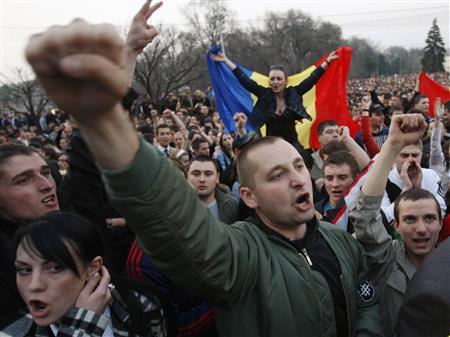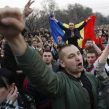
Molodova’s Political Crisis Deepens
Publication: Eurasia Daily Monitor Volume: 6 Issue: 79
By:

The security situation in Chisinau has stabilized in the wake of the April 7-8 violent riots, devastation of the parliament and presidency buildings, and post-factum police crackdown. While order has been restored, the political crisis is deepening as the opposition rejects the outcome of the April 5 parliamentary elections, despite the overall positive assessment of the electoral process by European observers. If the newly elected parliament is prevented from convening, or fails to muster the quorum for electing a new head of state (to replace the outgoing President Vladimir Voronin), Moldova will be plunged into a constitutional crisis amid its ongoing recession.
If the newly-elected parliament does convene and get down to work, it will be acutely polarized between the pro-government party and the tripartite opposition on a 60 to 41 ratio, and in constant agitation, but still capable of functioning. The opposition parties’ tactics, however, seem designed to block the parliament’s opening and to force new elections. Using incendiary rhetoric, opposition leaders accuse the authorities of having falsified the election results and having themselves arranged the assault on the parliament and presidential buildings.
The recount of ballots, however, has fully confirmed the results of the first count (EDM, April 7, 10). The recount data, released on April 21, show the nominally Communist Party with 49.5 percent of the votes cast; two nominally Liberal parties, with 13.1 percent and 12.4 percent, respectively; and the party Our Moldova with 9.8 of the votes cast, in a voter turnout of 57.5 percent countrywide (minus Transnistria, where the Moscow-installed authorities do not allow residents to vote in Moldova’s elections). Under the proportional system, the Communists have obtained 60 parliamentary seats; the Liberals and the Liberal-Democrats, 15 seats each; and Our Moldova 11 seats, in the 101-seat parliament. The other parties fell below the 6 percent threshold, with their votes accruing to the four parties that passed it (Moldpres, April 21).
The Communist Party had requested the recount after those three parties had cried fraud on the original vote-count. The electoral commissions performed the recount from April 15 through April 21, but the three parties boycotted the recount. They had participated in the electoral commissions’ original count and knew that it must have been correct. After boycotting the recount, the opposition parties are nevertlehess contesting its results. Under Moldova’s electoral legislation, the results of the vote-count -or those of the recount, if one is performed- are to be referred to the Constitutional Court for final validation of the election’s outcome and certification of the parliamentary deputies’ mandates. Opposition leaders, however, are warning that they might not accept the verdict of the Constitutional Court if it validates the election’s outcome (Moldpres, April 22).
Meanwhile the opposition parties have switched their main challenge to the voter registration lists, claiming that state authorities had padded the lists with fictitious or deceased voters. The three parties developed this thesis only after the elections, and not before. Under Moldova’s electoral legislation, voter registration lists are compiled by the local electoral commissions, which then put the lists on public display at commission offices, polling stations, and on the internet, twenty days ahead of the election day. Opposition parties are represented on all electoral commissions; and the twenty-day period allows ample opportunities for list-checking by voters and parties in advance of the elections. The three parties, however, decided only after the elections to challenge the voter registration lists, apparently as a fall-back option if the vote-count was to prove correct. Claiming that the state department for informatics (which stores the population’s registration data) had tampered with the voter lists in ways that altered the elections’ outcome, the three opposition parties have since April 10 been conducting their own re-checking of the lists and demanding more time for this exercise.
In private conversations with selected foreign visitors ahead of the elections, opposition leaders were hinting that they were prepared to force the holding of new elections soon after the regular April 5 elections. They had not taken such decision before these elections and have, in all likelihood, not actually taken such a decision since April 5; but they are, again privately, considering and debating such a course of action.
Two options are under consideration in this regard. One is to reject the outcome of the just-held elections and to force the holding of repeat elections. This tactic is discernible in the all-out effort to de-legitimize the authorities through accusations that they falsified the election results and then destroyed the parliament and presidency in a "Reichstag fire." Why the authorities would need to plot that destruction after winning the elections (even if they had won fraudulently) does not seem to be part of this logic.
The opposition’s other option under consideration is to allow (albeit amid continuing, vociferous protests) the parliament to open but then prevent the election of a new head of state. Under Moldova’s constitution, the head of state is elected with the votes of at least 61 deputies in the 101-seat parliament. If that number falls short after several rounds of balloting, the parliament is automatically dissolved and new elections (as distinct from repeat elections) must be held with new electoral slates, participation of all political parties, and an entirely new pre-election campaign. This process would take until August or September to complete, with the presidency vacant and the state coffers empty.




